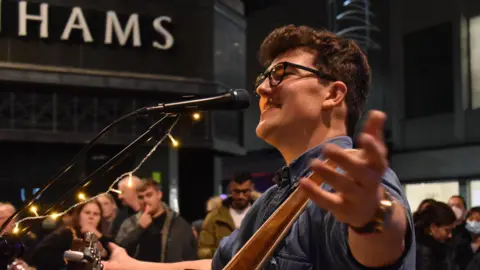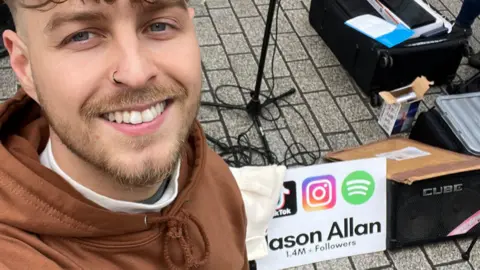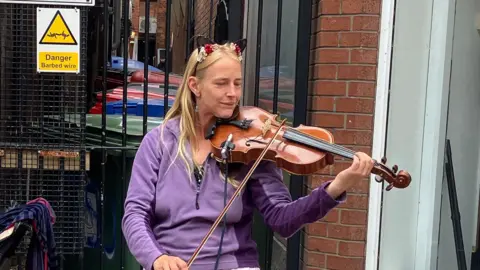'There will always be demand for street buskers'
 Jake Keating
Jake KeatingBuskers have entertained city-centre crowds throughout history, with many famous faces starting out on the streets. But with the music industry going digital, fewer consumers carrying cash - and increasing fears about safety – how is the artform faring?
Last week, Jason Allan announced he was no longer setting up his pitch in Leeds after a number of violent incidents.
He also cited the move from cash to card payments as a reason playing on the streets was increasingly difficult.
"It was a couple of things that happened in a very short period of time," he said.
"People have less money, you know it's gone from cash to card so I think it was difficult from the get-go but I could handle that, it was just more that when the threat of violence came in, that's when it became a little bit too much for me."
Mr Allan's recent confrontation with some teenagers went viral last week with more than 17m views.
While busking around the UK – including in London, Birmingham, Glasgow and Newcastle – Mr Allan films his performances for his Instagram and TikTok pages.
His approach as a musician is to use busking to promote shows inside venues and meet new people.
"I give myself a month to promote the show," he said.
"I'm meeting lots of new people on the streets, building a bit of a community, selling tickets, telling them about me and my music.
"Leeds was a bit more difficult this time and I think that it's just become more difficult for all buskers."
 Jason Allan
Jason AllanBradford-based Jake Keating, 28, also busks in Leeds. But he does not stream his performances to TikTok and is "not looking for a viral video either".
"I understand the way the music industry is geared up," he said.
"A significant portion of breaking into the industry is in and around online content.
"I busk to connect with people. I personally choose not to stream because I'm not looking for a traditional career in the music industry."
'A welcoming city'
Mr Keating is a leading member of Keep Streets Live, a community group set up to support and protect buskers.
He said a lot of the group's work was about promoting the benefits of art in public spaces.
"Performances in public spaces are a really important foundation and cornerstone of our national identity," he said.
"I can see all aspects of society come together, whether it's people who are sleeping rough, people who are out on the town having a night out - they all come together and dance or party or enjoy an experience and a lot of people respect that and really appreciate it.
"I'm really sorry to see the interaction Jason had and it wasn't a positive one this time around.
"I want to reassure people that Leeds isn't a dangerous place. It's such a brilliant city and it's a safe city, it's a really welcoming city. "
 Grace Wood/BBC
Grace Wood/BBCBut on the streets of Leeds on Wednesday, busker Katie Gittins described a recent incident in which her takings were stolen.
"He literally took everything I'd made that day and I'd only made like 15 quid," she said.
"I was pretty hungry at the time and I was trying to get the money together for a gas and electric bill.
"When it is most of your income, it does weigh on you a hell of a lot more. Buskers like Jason have the luxury of having income from another place."
Ms Gittins has been busking for about three years, mostly in Leeds, but also in Leicester, Wakefield, Bradford, Newcastle, Sheffield and Richmond.
While we're talking a busker approaches Ms Gittins to warn her that another performer has had their sound equipment stolen.
"In the last couple of months, that's the second load of someone's musical equipment that's been stolen," she said.
"This whole week has just felt weird. I don't know if that's the result of all the tensions that fizzled over during the heatwave.
"But to me, the altercation I saw that Jason caught on video. Honestly, that looks like a regular Saturday night."
She blames the increasing difficulty of busking on streaming and lack of music education in school.
"Withdrawing the funding from the arts has meant young children are not introduced to music or taught to respect it," she said.
"The modern streaming system means everybody can just download music for free.
"A lot of my friends are independent artists. It just seems like they're not getting anything back for the effort they're putting in and it's not just them."
A spokesperson for Leeds City Council said any safety concerns should be reported to the police.
"We are proud to support busking as a vibrant part of our city's culture," they said.
"Keeping people safe, and ensuring they feel welcome in the city, is a priority for us and our Safer Leeds team works in partnership with other organisations across the city, including emergency services, to achieve this."
How do buskers take cashless payments?
Nick Broad is co-founder and former CEO of The Busking Project, which is behind the busking payment platform Busk.co.
Busk.co allows performers to get tipped via Apple Pay, Google Pay and PayPal.
"There are fewer street performers today because of cashless payments," he said.
"The cost-of-living crisis and gentrification push struggling artists out of city centres and add to that the rising inflation, street performers need to be earning more than ever before but they are earning less."
But despite backing the revolution in digital payments, Mr Broad is wary of encouraging buskers to push their art online.
"I can't stand the digital landscape," he said.
"During lockdowns people set up online and put time and money into looking good for Zoom concerts. That's all good but then we came out of lockdowns.
"If you create music and upload it to platforms like TikTok or Spotify you're competing with an algorithm for views and it's not always about artistic integrity."
Busk.co works with artists in Australia, the US, Canada and the UK. And safety is not a concern Mr Broad regularly hears people complain about.
"Busking is the one part of outdoor city life that has lasted from ancient times until now. The hawkers, market traders, kids playing games, news callers and so on have all been eradicated," he said.
"Street performers are still there for a very good reason: there will always be demand for entertainment, and people will always be willing to support a good show."
Listen to highlights from West Yorkshire on BBC Sounds, catch up with the latest episode of Look North.
